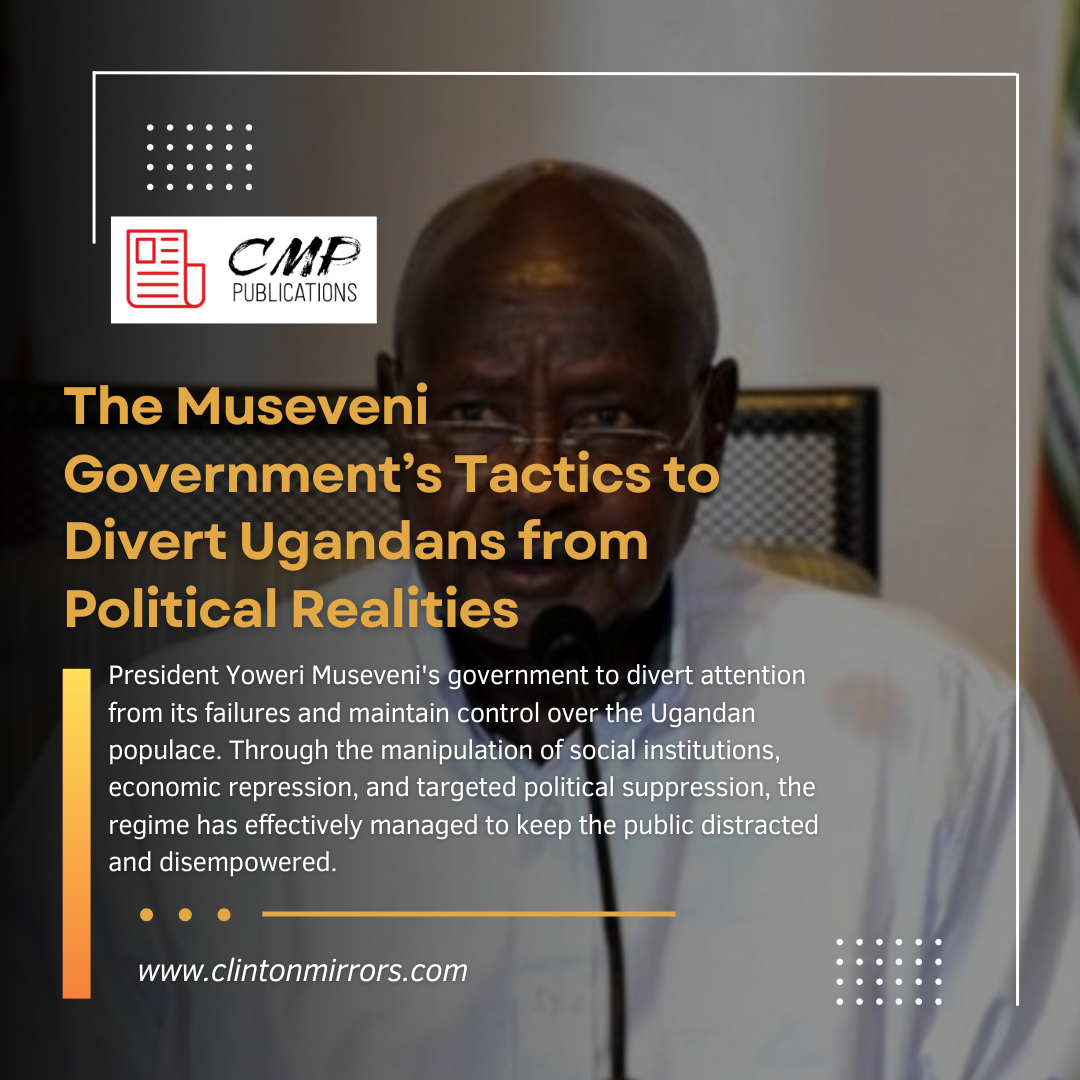Introduction
This report, conducted by Clinton Human Rights, delves into the systematic strategies employed by President Yoweri Museveni’s government to divert the attention of Ugandans from critical political issues and governance failures. The analysis reveals how the government uses social institutions like bars and churches, alongside economic manipulation and targeted repression, to maintain control and suppress dissent.
Social Institutions as Tools of Diversion
Bars and Alcohol Consumption
The government has subtly promoted the proliferation of bars and alcohol consumption as a means to keep the populace distracted. The rapid increase in bars across urban and rural areas has created an environment where many Ugandans spend a significant amount of their time and resources. This phenomenon serves multiple purposes for the government:
Economic Distraction: With a large portion of the population engaged in nightlife, there’s less focus on socio-political issues.
Social Control: Alcohol consumption can dull critical thinking and diminish the likelihood of organized dissent.
Revenue Generation: The government benefits from taxes on alcohol sales, while simultaneously using the industry to keep people occupied.
Churches and Religious Leaders
The Museveni administration has strategically co-opted religious leaders and institutions, leveraging them as tools for political control and societal pacification.
Financial Incentives: Religious leaders are often given substantial financial support, ensuring their loyalty and discouraging them from speaking out against the government. These payments create a dependency that aligns church leaders’ interests with those of the state.
Political Messaging: Churches are used as platforms to disseminate pro-government propaganda, framing Museveni as a divinely ordained leader. This manipulation of religious sentiment diverts attention from the regime’s failures and human rights abuses.
Suppression of Dissent: The co-optation of church leaders means that religious institutions, which could potentially be powerful voices for justice and reform, are neutralized or even act as agents of state propaganda.
Economic Manipulation and Poverty
Neglect of Social Services
The Museveni government has consistently underfunded critical social services, exacerbating poverty and social inequality.
Street Children and Homelessness: The failure to address the needs of street children and the homeless population reflects a deliberate neglect aimed at maintaining a dependent and disempowered citizenry. The lack of budget allocation for these vulnerable groups indicates a strategic choice to ignore their plight.
Boda Boda Industry: Many young Ugandans are forced into the boda boda (motorcycle taxi) industry due to the lack of viable employment opportunities. This sector is characterized by low income, high risk, and instability. By keeping a significant portion of the youth in such precarious economic conditions, the government ensures they remain too preoccupied with daily survival to challenge the status quo.
Financial Repression
The economic policies of the Museveni administration have entrenched poverty and limited upward mobility for many Ugandans.
Inflation and High Taxes: The high cost of living, coupled with onerous taxes on essential goods and services, further impoverishes the populace, making it difficult for them to focus on anything beyond immediate economic survival.
Control of Wealth: The Museveni regime maintains tight control over lucrative sectors of the economy, ensuring that wealth remains concentrated in the hands of a few loyalists while the majority languish in poverty.
Political Repression and Surveillance
Suppression of Opposition
Museveni’s government employs a range of repressive tactics to silence opposition and maintain its grip on power.
Arbitrary Arrests and Detentions: Political opponents and activists are frequently subjected to arbitrary arrests, detentions, and even torture. This climate of fear stifles dissent and discourages political engagement.
Media Censorship: Independent media outlets face severe restrictions, with journalists often harassed, arrested, or even disappeared. The government’s control over information flow ensures that critical voices are marginalized and public awareness of governmental failures is minimized.
Surveillance and Intimidation
The extensive surveillance network established by the Museveni regime monitors the activities of potential dissidents, creating an atmosphere of constant fear and suspicion.
Intelligence Agencies: The government’s intelligence apparatus closely monitors opposition figures, activists, and even ordinary citizens, deterring them from participating in any form of resistance.
Community Spies: The regime employs community informants who report on local activities and sentiments, further entrenching the culture of fear and self-censorship among the populace.
The investigation conducted by Clinton Human Rights exposes the multifaceted strategies used by President Yoweri Museveni’s government to divert attention from its failures and maintain control over the Ugandan populace. Through the manipulation of social institutions, economic repression, and targeted political suppression, the regime has effectively managed to keep the public distracted and disempowered. This report underscores the urgent need for increased awareness and international pressure to address these systemic abuses and support the Ugandan people in their quest for justice and democratic governance.

